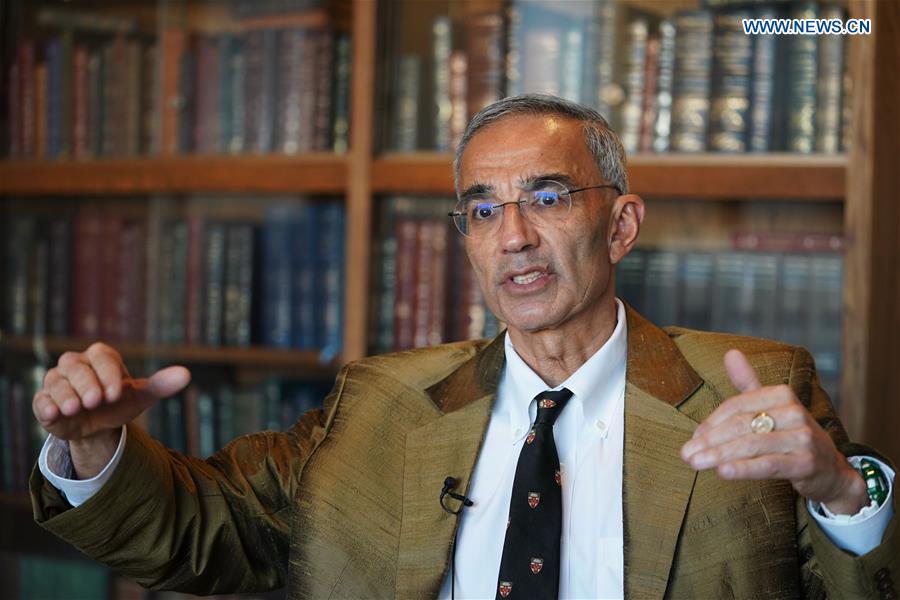
Raj Bhala, Brenneisen distinguished professor at University of Kansas Law School speaks during an interview with Xinhua in Lawrence, Kansas, the United States, on Dec. 10, 2019. It's "tragic" to see the World Trade Organization (WTO) Appellate Body be "asphyxiated" by the United States, said Raj Bhala, who calls the current state of the body a step back for the multilateral trading system. TO GO WITH "Interview: Trade law expert says WTO Appellate Body impasse "major setback" to multilateral trade"
by Xiong Maoling
KANSAS CITY, Dec. 11 (Xinhua) -- It's "tragic" to see the World Trade Organization (WTO) Appellate Body be "asphyxiated" by the United States, said a law professor and an international trade expert, who calls the current state of the body a step back for the multilateral trading system.
"When you remove a pillar of adjudication that stands for equal justice and that provides a level playing field, you introduce more political power elements into dispute resolution," Raj Bhala, Brenneisen distinguished professor at University of Kansas Law School, told Xinhua Tuesday.
"So smaller countries can be more easily bullied by larger countries," said Bhala, who also serves as a senior advisor at Dentons U.S. LLP, a law firm.
The WTO is no longer able to review dispute rulings because its Appellate Body no longer has enough judges. The terms of two of the three remaining judges ended on Tuesday, and the United States has blocked the nomination of new judges.
The "immediate impact" of the Appellate Body impasse is that WTO members no longer can appeal decisions to this Supreme court of international trade, while the longer term impact is "a diminution in the international rule of law," said Bhala.
Since the Second World War, the trading community has searched for the "right formula" for a dispute settlement system, and it finally found one in the Uruguay Round negotiations, which eventually created the WTO, and this has been operating "very successfully" for now almost a quarter century, he noted.
"And now we're back into the possibility of a little bit more of power relations and political diplomacy in dispute resolution," said Bhala. "It's a major setback to the multilateral trading system."
A "great irony," Bhala noted, is that the United States was the "driving force" in the Uruguay Round behind the creation of the Appellate Body.
Bhala believes that the United States should have taken a constructive path and pushed for reform instead of "strangling" the appellate body, leading to the current deadlock.
What the United States did, however, is massively slash the budget of the appellate body, constrain how it spends money and further limit the budget of the WTO, which is vital to protecting free and fair trade, he added.
"What the U.S. strategy was, well, if the U.S. doesn't get its way, it's going to use the budget strengths," Bhala said, noting that the United States is the WTO's biggest contributor. "It has not killed the organization yet, but it is hampering it with its budgetary limits."
Bhala said there are proposals that other WTO members have suggested for reform. The United States should try to reach consensus with other parties and champion reform. "I think there are some grounds for compromise and moving forward," he said.
Commenting on the rising wave of anti-globalization and protectionism, the trade law expert said the perception among people worldwide that openness to trade is causing insecure jobs and falling incomes is "an overblown criticism."
Bhala said automation, rather than globalization, is responsible for most of the job loss and income decline. "So to blame NAFTA (North American Free Trade Agreement) or China or the WTO for the job loss and income decline is an overblown criticism. It's not fair. It's not accurate," he said.
Bhala noted that part of the concerns about globalization worldwide actually has resulted from the exacerbation of inequality, which is based on domestic policies such as welfare and tax systems. "So it's not trade that's necessary to blame," he said.
Besides urging governments to engage with their populations, the law professor also highlighted the importance of human capital development in the era of globalization.
"It's going to take political leadership from major figures to educate or reeducate the public that trade is a lot more about opportunity and (than) risk if you have the human capital, the skills to take advantage of trade," he said.



